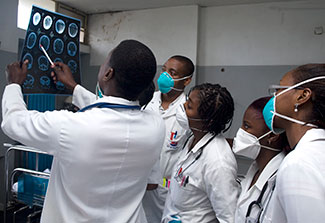
Fogarty continues to advance African health education
January / February 2018 | Volume 17, Number 1

Photo by Richard Lord for Fogarty/NIH
The new Health-Professional Education Partnership Initiative
(HEPI) program will strengthen the research and health care
workforce in eight African countries.
(HEPI) program will strengthen the research and health care
workforce in eight African countries.
Fogarty is seeking applications for projects in eight African countries in the next phase of its efforts to advance research capacity and strengthen the continent’s health workforce. The President's Emergency Plan for AIDS Relief (PEPFAR) plans to invest up to $37 million over the next five years to support the awards.
Through the Health-Professional Education Partnership Initiative (HEPI), new projects will leverage the achievements and lessons learned from the previous Medical Education Partnership Initiative (MEPI), MEPI Junior Faculty Research Training program, and the Nursing Education Partnership Initiative (NEPI). About 10 five-year grants are expected to be awarded, with each providing up to $600,000 per year. HEPI funding will support creative educational activities with a primary focus on skills development, research experiences, mentoring activities, curriculum or methods development, and outreach.
The new program is targeting eight low-resource countries: Ethiopia, Kenya, Malawi, Mozambique, Tanzania, Uganda, Zambia and Zimbabwe. Applicants are not required to have previously engaged in MEPI or NEPI but must include a participant as a partner in their proposal.
Health-Professional Education
Partnership Initiative (HEPI)
Sample activities to be supported:
Courses for Skills Development
- innovative, hands-on community-based training, problem-based learning
- advanced courses in clinical procedures, simulations or new technologies
- training in core capabilities, such as ethical review, and grants and financial management
Research Experiences
- research topics should be locally relevant and address the country's health priorities
- provide opportunities for inter-professional and/or multidisciplinary experiences
- a focus on addressing barriers to HIV/AIDS service delivery is a priority
Mentoring Activities
- provide high quality supervision in research and clinical education
- give career guidance for health professional students, post-graduates and junior faculty
- training in mentorship and leadership for all career stages
Curriculum or Methods Development
- develop novel instructional approaches or computer-based educational tools
- creative approaches to curriculum that consider national goals for the health workforce
- educational experiments to determine effectiveness of new approaches
Outreach
- develop electronic platforms and learning models to facilitate interaction and shared teaching
- disseminate research findings through oral presentations and publications
- engage with governmental, civil society and other stakeholders
A related five-year award - called the African Association for Health Professions Education and Research - will establish a body to convene and facilitate institutions across Africa to jointly develop and share best practices, innovations and curricula. The association will be supported with up to $750,000 per year to provide leadership for activities that will increase the quality, quantity and retention of African health professionals, and address HIV/AIDs and other illnesses across the continent.
Many of HEPI's goals continue in the path established by MEPI/NEPI. Funding is directed at expanding and enhancing medical and nursing education models, developing strategies to reduce brain drain, and providing resources to train health professionals in neglected regions where they are needed most. The program also aims to encourage evaluation and dissemination of best educational practices, enhance capacity for locally-relevant research, and address national needs in consultation with health and education ministries and other stakeholders.
HEPI applications must include Principal Investigators who are citizens of an African country and employed by an African institution. Co-Principal Investigators must also be African citizens. Applicants are required to partner with at least one eligible institution in the same country, and may collaborate with a consortium of eligible institutions. Some joint activities between nursing and medical students are also required. NIH's National Institute of Nursing Research (NINR) will provide nursing science expertise.
From 2010 to 2015, MEPI funded 13 African universities - which included a network of 32 participating African institutions and 20 partnering U.S. institutions - to strengthen medical education, build research capacity and improve faculty retention. In parallel, NEPI funded 22 nursing schools in six African countries to enhance nursing education, leverage academic-practice partnerships, and increase the quality and quantity of nurses and midwives. In 2015, NIH began a new program designed to provide career development opportunities for junior faculty at MEPI institutions.
"We're excited to strengthen and expand the growing network of institutions that is transforming medical and health education throughout Africa," said Fogarty Director Dr. Roger I. Glass. "This is truly an example of the whole being greater than the sum of its parts. By leveraging resources, sharing curricula and increasing interaction between medical and nursing students, the HEPI network will advance discovery and improve health across Africa."
HEPI and Association applications are due on March 28, 2018.
More Information
To view Adobe PDF files, download current, free accessible plug-ins from Adobe's website.





















.png)












No hay comentarios:
Publicar un comentario